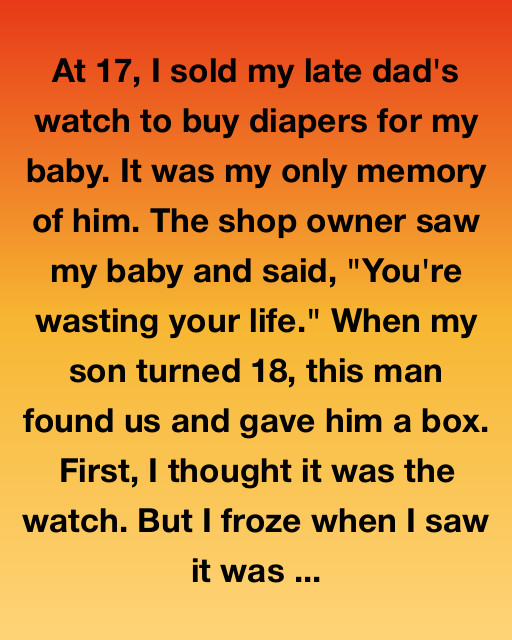I was seventeen, a child raising a child, the first time I walked into Sam’s Pawn Shop. The bell rang, cheerful and strange against the tight knot of worry in my stomach. I held my baby son, Elijah, close, and in my other hand, I clutched my father’s watch. My dad had died when I was eleven, in a car crash that split my life into “before” and “after.” The watch was all I had left of him. It was scratched and heavy, but sometimes I swore I could still smell his cologne. At night, I would hold it and imagine its ticking was his heartbeat.
But feelings don’t pay bills. By seventeen, I lived in a small, damp apartment, scraping by on a part-time grocery job. That morning, I counted only three diapers left. A red bill notice was taped to my door. My bank account was empty. I knew what I had to do. I whispered sorry to my father’s ghost and drove to Sam’s.
Sam was a kind of fixture in the neighborhood, his eyes carrying a weight of many sad stories. He looked at me, at Elijah, and at the watch.
“You sure about this?” he asked.
“Yes. I need cash.”
He turned it over in his rough hands. “Where’d you get it?”
“It was my dad’s. He died when I was a kid.”
He named a price. Enough for diapers, milk, and keeping the lights on another week. I nodded, feeling a piece of my soul leave. He slid the money across the counter and said, “You’re wasting your life. You’re too young for this.”
I took the cash and left, crying in the car. His words haunted me for years.
But life went on. I finished high school at night, worked double shifts, and raised Elijah into a kind, strong young man. The watch stayed with me, a hollow ache and a symbol of what I had sacrificed.
Then came the knock on the door.
Elijah was eighteen. Sam stood there, older now, hair white and back bent, but the same sharp eyes. He had a wooden box for Elijah—and a thick envelope for me, with my father’s handwriting on it.
Inside the envelope were letters my father had written years before. He wrote about his love for me, his pride, his worry. Then I found the part that stopped my breath:
“I left something behind. Not just the watch. I made a deal with a man named Sam. He will give you this letter and the rest when you need it most. Use it wisely. And if you ever have a child, tell them I would’ve loved to meet them.”
Sam handed me a small brass key. The box held deeds to a small cabin my father had bought for me, photos of him building it, and the watch, safe in a velvet case.
“I lied that day,” Sam said. “I never put the watch up for sale. I wanted you to have it when the time was right. You weren’t wasting your life. You were saving your son.”
We drove to the cabin that weekend. Dust motes danced in sunlight, and for the first time in years, I felt peace. We restored the cabin together, and it became a refuge for young single mothers, a place of hope and healing.
Sam died three years later. At his funeral, I told everyone how a harsh judgment had hid a decades-long promise kept, saving my father’s legacy until I was ready to carry it.
I wear the watch now, not to tell time, but to remember that life circles back. What feels lost can come back in ways you never expected. That day I walked into Sam’s Pawn Shop felt like the end—but it was really the start of a story of resilience, love, and hope.
